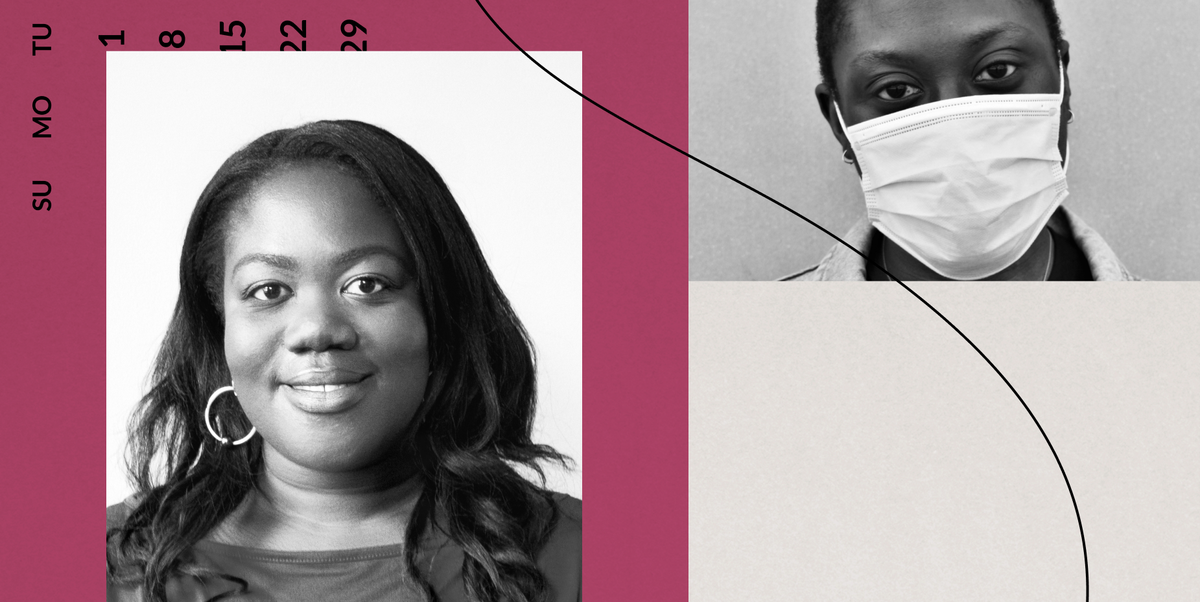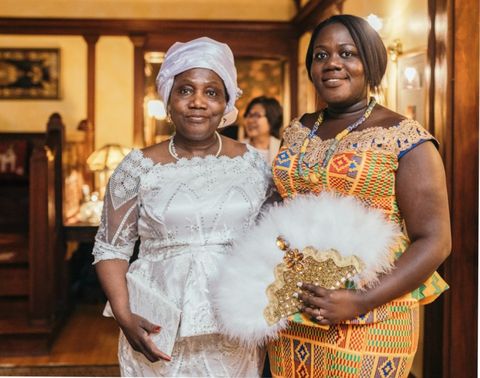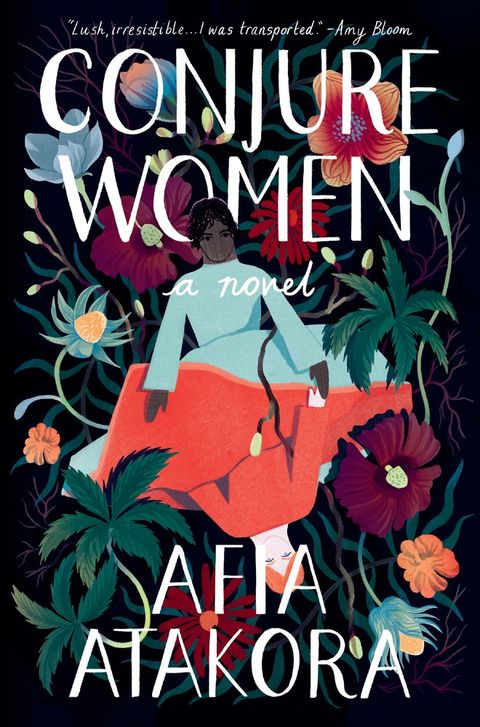During the uncertain first months of quarantine, ELLE.com asked several novelists to chronicle their new normal with a tribute to the person helping them get by. The results—heartfelt and harrowing—are presented here as a grateful salute to those who kept the world spinning in the year’s darkest moments.
My mother’s touch is sterile. I mean that quite literally, antiseptically, her hands are always clean, dry, and cold; that my first memories of her are of the well-practiced motion of her putting on medical gloves over freshly washed hands, a deliberate dance to avoid contamination. When I think of her I can taste the powder they put in nitrile exam gloves to make them easy to slip on, hear the snap of the elastic at her wrist, picture her Black chapped hands through the sheen of blue synthetic rubber.
I used to lie and tell people she was a nurse. A child’s lie, an over-simplification, because what my mother taught me early on was to not let people into our business, to keep them at arm’s length and to keep that arm sterile. What she was was a home health aide, a care provider who attends to the daily needs of the chronically ill, the elderly, the disabled, and the dying—right in their own homes. And she would take me with her.
Newly come to America from England—before that, newly come to England from Ghana—my mother found the only way to assimilate into Western culture was through the medical profession, that universal, respectable trade of healing. Her accent, her color, her class, barred her from corporate or retail work, but the medical field was the one stable career in which those things would not matter, at least at first. Never mind that she had studied nursing and medicine in Ghana, never mind that she was a native English speaker—here and now she could have a green card and make minimum wage, in the mid ‘90s something like $5 an hour, in a field that would always be essential.
She took me with her when there was nothing else she could do, no daycare or babysitter she could afford, no latch-key deadbolt combo on our door she could trust. The patients were accommodating, some encouraged it, so many were homebound that a quiet, careful child was a novel bright spot in their otherwise repetitive days. I learned to be small and unobtrusive in my body, in my needs. My mother was working, the patients were strangers. They needed her. We needed them. And in some ways they were like her children more than I was: She fed them and bathed them, changed bed pans, colostomy bags, diapers. I saw them laugh with her, I saw them frustrated or angry, I saw them wrap their frail arms around her neck so that she, strong, could heft them upward into new, better positions. Some rebelled against her, and I saw that too, demanding that she cook or clean or run their errands. Some viewed her as little more than the help. But most respected her, cared for her, trusted her.
“Cold hands,” they’d say, “but a warm heart.” I saw that she treated them all the same, with care, with dignity, but at a respectable distance. She touched every corner of their lives, with clean hands and thick gloves.
In the memories with the patients I am always eight, impossibly, as the experience spanned several years. Still, in memory, I’m old enough to know where I’m going and why, old enough to understand that these people employ my mother, or that their families do, that they are sick—long-term sick, lifetime sick, born sick, or the sick that comes from living long. Old enough to know that in any and all of these cases, the patients are white and we are not. That they have the money and we do not.
In kid logic, the patients are always wildly rich, blessed with abundances of comfort that seem outrageous—reclining furniture and fridge doors that dispense ice, cubed or crushed, televisions equipped with satellites that beam in the good cartoons, not at all like our bunny antennae liberally wrapped in tinfoil to dispel the fuzzies on any channel above single digits.
One patient, a middle-aged man who I only understand now had cerebral palsy, lived alone in a large house with an in-ground pool right in his backyard, the sight of which must have made my eyes visibly sparkle.
“She can go swimming anytime,” he told my mother.
From the swell of his electric wheelchair, he seemed to look down on me, baffled when I told him that I didn’t know how to swim.
Most often I was bundled up and regulated to one room, to amuse myself with a book or the TV, left to sit still in the usually plastic-covered couches that seemed to repel me. I did not belong. I was never comfortable in the homes of the patients, even the ones I liked.
I remember my mother attending to a woman in her nineties who too lived alone in a senior living facility. A widow, her kids grown, successful and as a result, distant. Because of that fact or in spite of it, she took a liking to me. She taught me her favorite card games and when we tired of that she taught me to be the dealer. She taught me how to bridge shuffle on a set of playing cards as yellow and worn as her fingers. I still think of her whenever I crack a deck of cards fast and hard in a flourishing arc. Eventually, we stopped going to see her, which must have meant she died, though my mother never told me that and I never questioned it. People, the patients, were like that—in your life completely, then out of it as quickly as a card trick.
My mother taught me to respect the patients. It was just as rude to stare as it was to look away. She impressed the fact that they were no different, no less able than we were. Still, I had to understand the ways to move around them and the inevitable machinery that comes with illness. I grew to tune out the beeps and hums, to be comfortable with the body ticks and shifts in mood, the tiredness, the sudden defeat. The world of the patients was maddeningly unpredictable but we enforced order. We washed our hands when we entered, we washed our hands when we returned home again. Hot water and soap became both the barrier and the bookend against it all.
I absorbed early on that there is some failing in “catching it”—both sickness and sadness. That to lower the shield is to become vulnerable, susceptible, exposed. That you must armor yourself appropriately against harm and loss and love—with gloves and mask and distance. To me sickness will always smell like the absence of it; death, the same—the way we scrub and shield to retain control; the chemical is the only way to protect against the inevitable.
Once, I asked a patient, the man with cerebral palsy, how despite the limitations of his body he had learned to swim. With his eyes, he pointed to the sumptuous outdoor swimming pool, the one I’d coveted. “When I was a little boy my mother threw me in,” he told me. “She said, ‘Swim,’ so I had to.”
My own mother rarely talks of the patients, or the many hospitals where she has worked, or anything really of great emotional gravity. Some vulnerable truths slip through: The memory of NICU babies in Africa born stiff with tetanus, or the irony of watching a woman she’d known from her childhood, a renowned village healer, die slowly in an oncology ward. My mother only told me years later of one patient, an elderly white man, who made lewd comments about her dark skin everyday while she washed him, dried him, applied ointment to his bed sores.
Now, the whole world takes small comfort in washing its hands. I think about my mother every time I scrub up. I sing happy birthday to her twice. Like if I wash well enough I can overcome the cost of touch, the fear of loving fragile things. That brief calm dries up faster than my wet hands do, but what remains is what I witnessed and took me all these years to understand: How love still exists despite necessary distance.
This content is created and maintained by a third party, and imported onto this page to help users provide their email addresses. You may be able to find more information about this and similar content at piano.io


